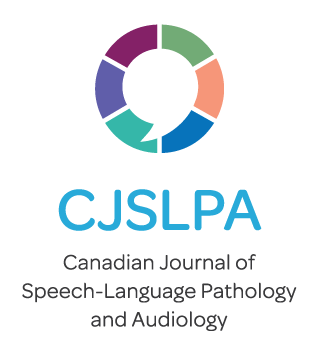

| Author(s) |
Katrina DeZeeuw Emilie Lalonde Myers |
| Volume | 44 |
| Number | 2 |
| Year | 2020 |
| Page(s) | 49-56 |
| Language | English |
| Category | Clinical Focus |
| Keywords |
Medical Assistance in Dying Assisted death Assisted dying Physician assisted death Euthanasia Communication Alternative and augmentative communication Communication impairment Speech-language pathology |
| Abstract |
Communication is an integral part of the medical assistance in dying assessment process in Canada, as reflected by the legislation of Bill C-14 (2016), provincial and hospital policies, and professional association statements. For patients with communication impairments, which are common in the end-of-life patient population, the ability to communicate their wishes regarding care, including medical assistance in dying, can be very challenging. Speech-language pathologists have training in assessment and treatment of communication and cognition impairments, therefore are uniquely qualified to support these patients and ensure that their basic human right to communicate is respected. However, there is a paucity of published literature regarding the role of speech-language pathologists in medical assistance in dying. This paper reviews the role for speech-language pathologists in medical assistance in dying and recommends an approach to integrating their expertise into the medical assistance in dying assessment process.
Au Canada, la communication fait partie intégrante du processus d’évaluation de l’aide médicale à mourir, comme en témoignent le projet de loi C-14 (2016), les politiques provinciales et hospitalières, ainsi que les énoncés de position des associations professionnelles. Parmi les patients en fin de vie, nombreux sont ceux ayant un trouble de la communication. Pour ces patients, il peut s’avérer très difficile de communiquer les volontés qu’ils ont concernant les soins leur étant administrés, y compris ceux de l’aide médicale à mourir. La formation des orthophonistes inclut l’évaluation et le traitement des troubles de la communication et de la cognition. Ces professionnels possèdent donc des compétences uniques qui leur permettent de soutenir les patients en fin de vie et de veiller à ce que leur droit fondamental à la communication soit respecté. Peu de littérature n’a néanmoins été publiée sur le rôle des orthophonistes dans l’aide médicale à mourir. Le présent article examine le rôle des orthophonistes dans l’aide médicale à mourir et recommande une approche favorisant l’intégration de l’expertise de ces professionnels dans le processus d’évaluation de l’aide médicale à mourir. |
| Record ID | 1259 |
| Link | https://cjslpa.ca/files/2020_CJSLPA_Vol_44/No_2/CJSLPA_Vol_44_No_2_2020_MS_1196.pdf |
CJSLPA is an open access journal which means that all articles are available on the Internet to all users immediately upon publication. Users are allowed to read, download, copy, distribute, print, search, or link to the full texts of the articles, or use them for any other lawful purpose.
CJSLPA does not charge authors publication or processing fees.
Copyright of the Canadian Journal of Speech-Language Pathology and Audiology is held by Speech-Language and Audiology Canada (SAC). Appropriate credit must be given (SAC, publication name, article title, volume number, issue number and page number[s]) but not in any way that suggests SAC endorses you or your use of the work. You may not use this work for commercial purposes. You may not alter, transform, or build upon this work.